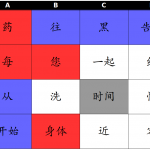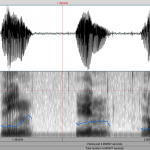Articles in the ‘Speaking’ category Page 8
-
How and why to learn and teach Chinese through games
This article is a follow-up to a keynote presentation and a workshop held at the 15th Annual Chinese Teaching Conference at University College London. Even though the original target group is teachers of Chinese, the article is relevant for students as well.
Read → -
8 tips for learning Chinese as an introverted student
Introverts are not necessarily worse language learners than extroverts, but not taking or creating opportunities to speak Mandarin will slow you down. In this article, I share some methods I’ve used to compensate for this as an introvert learner.
Read → -
Task-based Chinese learning and teaching
Task based language learning and teaching is built around working with tasks in the target language with a clear focus on meaning (communication). Focus on form should come after the task has been completed.
Read → -
Learning (or not learning) Chinese slang
Learning slang in Chinese can be fun, but it’s worth remembering that in most situations, it’s actually much less useful than more standard ways of expression. Slang is used in a limited context and changes quickly.
Read → -
Playing Codenames to learn Chinese and other languages
Codenames is one of my favourite games, and it also happens to be an excellent game for language learning! In this article, I suggest ways of playing it in Chines, along with a tool that generates grids of code words for direct use in the classroom or elsewhere!
Read → -
10 ways of using games to learn and teach Chinese
Games are great for learning languages. Here are ten ways you can use games to learn or teach Chinese as a second language!
Read → -
How to fake sounding like a native Chinese speaker
Have you ever wanted your Mandarin to sound more advanced than it is? In this guest article, David Moser tells us how to fake sounding like a native Chinese speaker. While tongue-in-cheek, some of the advice applies even if you’re after the real thing!
Read → -
Looking up how to use words in Chinese the right way
Looking up how to express something in Chinese is not as easy as it looks. Assuming that a word, especially a verb, can be used the same way in Chinese as in your native language usually results in incorrect or awkward sentences. Stop assuming and look things up properly instead!
Read → -
Obligatory and optional tone change rules in Mandarin
As if learning basic tones wasn’t enough, tones in Mandarin also influence each other and change depending on context. Some of these tone change rules you have to learn, but others are better left alone and will be absorbed automatically over time.
Read → -
Learning to pronounce Mandarin with Pinyin, Zhuyin and IPA: Part 3
As adults, understanding is important when learning pronunciation. One way to achieve this is through the International Phonetic Alphabet (IPA), which will allow you to see the sounds your ears might fail to hear. Learning IPA also means learning basic phonetics, and that will do you good in the long run!
Read →









